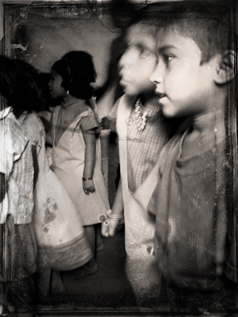 I heard this question posed on CNN this morning as commentators marveled at the worship and thanksgiving that was springing up on the streets of Port-au-Prince this morning. My limited exposure to the hurting and oppressed around the world in places like India, China, Eastern Europe and Southern Africa have suggested to me that the question “where is God in tragedy?” is uniquely American. Perhaps it is a question uniquely asked among the wealthy, the self-reliant.
I heard this question posed on CNN this morning as commentators marveled at the worship and thanksgiving that was springing up on the streets of Port-au-Prince this morning. My limited exposure to the hurting and oppressed around the world in places like India, China, Eastern Europe and Southern Africa have suggested to me that the question “where is God in tragedy?” is uniquely American. Perhaps it is a question uniquely asked among the wealthy, the self-reliant.
We who have been given so much struggle to understand how a loving God could subject his children to discomfort, tragedy, suffering, or need. Honestly, I have little stomach for discomfort. I have assumed that surely my best good will be found in the escape of suffering and lot along its path. Surely the love of God would be proved to me in the removal of suffering from my life.
Even a cursory search of the Bible exposes a vastly different worldview than the one by which we in the west weigh our lives. Difficulty and even tragedy are viewed as a path to walk, a journey toward a destination. “No discipline seems pleasant at the time but painful. But later on it produces a harvest of righteousness and peace” (Hebrews 12:11) As the church of the New Testament faced persecution and death, they were instructed to view their suffering as an honor (1 Peter 4). In the same way, the apostle Paul did not hide the myriad tragedies he faced as though they threatened the existence of a loving God. Instead, he boasted in them as a deeper proof of God’s patient shaping presence with him (2 Corinthians 6). We ask, “wouldn’t God keep his children from facing persecution.” The answer of the first century church would surely have been, “please do not remove this honor from us. Please do not rob us of this journey”
Further, when God decided to introduce Himself to the world in the person of Jesus, He did so by trading in crowns and palaces for swaddling clothes and a manger. He came to a persecuted people and was born into poverty. Suffering is not only true to the human condition, it is a core expression of Immanuel, God With Us. Jesus is not God’s removal of suffering from the world (though that day will come – Revelation 21). Jesus is the icon of God’s presence in the midst suffering. The Holy Spirit is God’s avatar with us in all that we face.
Among the urban poor in Mumbai, the rejected Roma of Eastern Europe, the earthquake refugee camps of the Sichuan province of China and even in my own relatively safe and comfortable experience in New Orleans in 2005, there is a very clear sense that God is present in the middle of suffering. God is not present with the purpose of removing suffering from us, not in this brief life. Instead, at our point of deepest dependance, God proves Himself as deeply dependable.
How can the followers of Jesus give him thanks and praise in the middle of such tragedy? How can a loving God allow suffering and tragedy like that in Haiti? Where is God? I’ll allow U2’s Bono to answer better than I could from his sermon at the National Prayer breakfast in 2006: “God may well be with us in our mansions on the hill… I hope so. He may well be with us as in all manner of controversial stuff… maybe, maybe not… But the one thing we can all agree, all faiths and ideologies, is that God is with the vulnerable and poor. God is in the slums, in the cardboard boxes where the poor play house… God is in the silence of a mother who has infected her child with a virus that will end both their lives… God is in the cries heard under the rubble of war… God is in the debris of wasted opportunity and lives, and God is with us if we are with them.”
